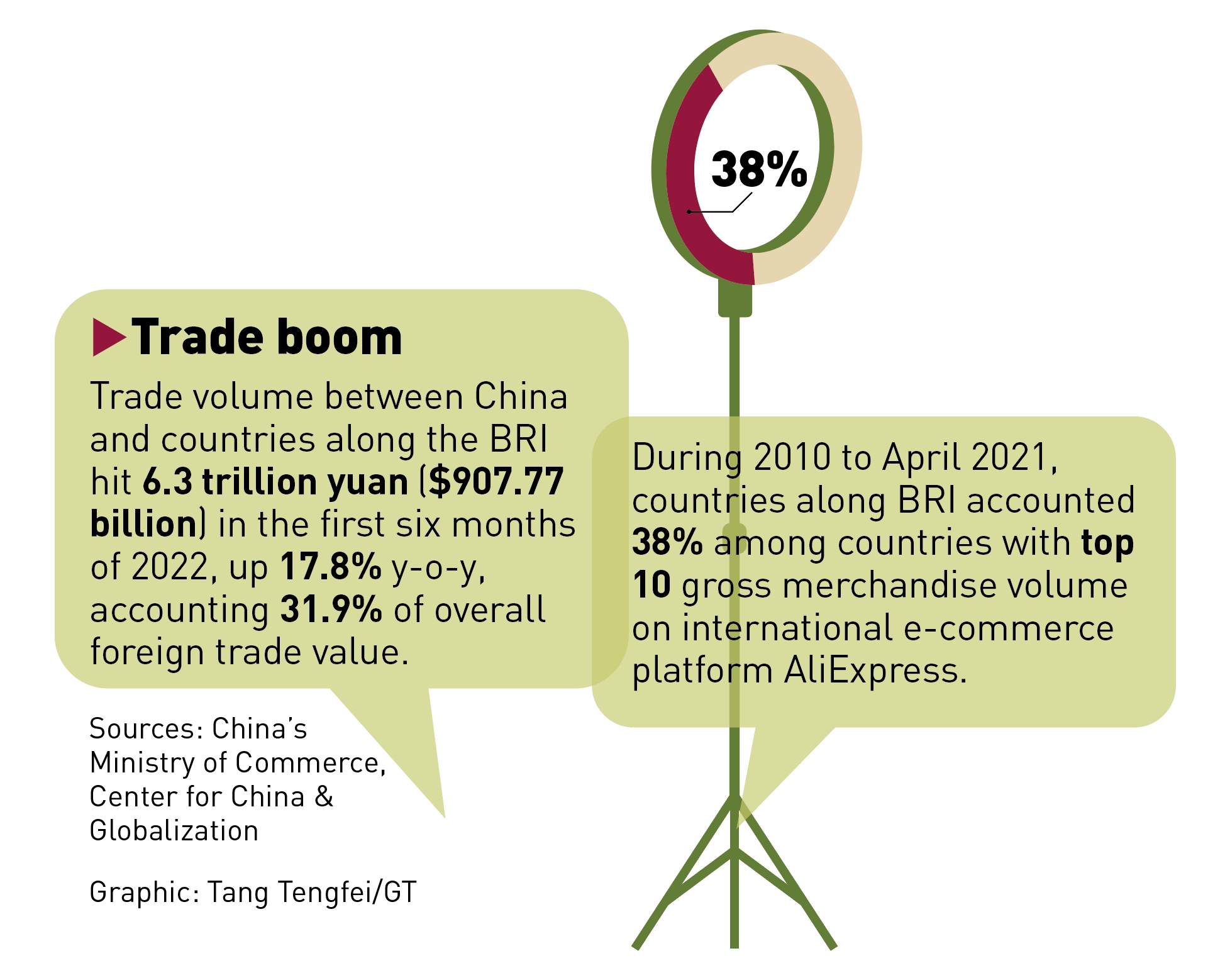E-commerce dimension to BRI in focus at 2022 CIFTIS
Embassy officials, biz chambers join livestreaming studio to promote specialities

Chiranjaya Udumullage, president of the China Sri Lanka Association for Trade and Economic Cooperation, (right), attends a live commerce event on September 2 during the 2022 CIFTIS in Beijing. Photo: Courtesy of CRI Online
A Belt and Road Initiative (BRI)-themed livestreaming studio at Shougang Park, one of the twin venues for the 2022 China International Fair for Trade in Services (CIFTIS) in Beijing, was among the most popular at the annual services gathering where an e-commerce dimension to the BRI was the focus of attention.
The livestreaming studio premiering at the 2022 CIFTIS is part of an event showcasing the cultural traditions of BRI countries, welcoming the participation of more than 30 foreign embassies in China and international organizations.
The embassies of Sri Lanka, Thailand, Hungary, Morocco and others set up stalls at the CIFTIS event, presenting local handicraft items, food and beverages. The diversity of exhibits, coupled with on-site cultural promotion activities and performances such as Muay Thai boxing, makes the event one of the most keenly watched at CIFTIS.
More specifically, the livestreaming studio called "international selection," an e-commerce project incubated in March by CRI Online, the website attached to China Radio International, quickly turned into a buzz phrase that matches the country's digital trade prowess.
What makes the live commerce project different from other global purchases-focused studios is that the newly incubated program is state media-backed and markets items endorsed by many embassies and business chambers in the country.
A number of foreign embassies and businesses have shown interest in taking part in the livestreaming campaign, and the selection of participating livestreamers is contingent upon whether their products qualify for online sales, Chen Gang, chief of the livestreaming project, told the Global Times on the sidelines of the services trade fair.
The livestreaming studio currently has an account on Douyin, the Chinese version of TikTok, which facilitates sales of items being offered by the embassies or business chambers through their proprietary online stores on Douyin, Taobao and other platforms. That means an online sales presence is a prerequisite for the special livestreaming attendance, according to Chen.
Some of the most live commerce-savvy foreign embassies and institutions that have had e-commerce accounts were therefore chosen for the campaign.
Over the course of CIFTIS, which runs until September 5, four live commerce sessions have been scheduled on a daily basis since Friday.
The Friday session featured tea, biscuits, among other Sri Lanka-origin products while the Saturday edition pitched fluffy alpaca toys from Peru and Hungarian wine. The Sunday episode was tailored for Syria's ancient soap, Damask rose essential oil, fabric products, and cultural and creative replicas of Syria's national museum. The Monday edition was scheduled to be Laos-specific.
The live commerce episodes familiarize viewers with a wide range of speciality items as well as local natural environments and societal rules and norms. The Friday session attracted 12,000 viewers and the Saturday and Sunday editions tallied viewer numbers of 6,200 and 11,000, respectively, the Global Times has learned.

Graphic: Tang Tengfei/GT
"This is the best chance for us to promote Sri Lankan products," Chiranjaya Udumullage, president of the China Sri Lanka Association for Trade and Economic Cooperation, told the Global Times.
Udumullage, who can speak Putonghua, joined another Chinese livestreamer on Friday to interact with the audience in the session, during which Sri Lanka tea culture was a main selling point.
Livestreaming is very popular in China, and the special campaign during CIFTIS presents foreign business communities with a very good chance to reach out to consumers, he said.
The Sri Lanka Embassy in China has a Douyin account. Additionally, a Sri Lanka national pavilion account was recently opened on the platform. A livestreaming event was held at the Sri Lanka embassy for the national pavilion account opening, with a few million visitors watching the live ceremony, Udumullage said, revealing that more than 30,000 orders were netted, "an amazing [achievement] over two-three hours."
"As a small country, we are looking for export development," he continued, reckoning that livestreaming marketing enables the South Asian economy to readily tap into China's huge consumer market.
As livestreamed commerce goes viral across the globe, such events are expected to be increasingly relied on for BRI countries to promote their products, Udumullage noted.
In a speech to a sub-forum on BRI services trade during CIFTIS over the weekend, Zhang Shenfeng, vice chairman of the China Council for the Promotion of International Trade (CCPIT), said that the COVID-19 pandemic has sent shockwaves through the traditional services trade, but at the same time it has fueled the emergence of new scenarios, technologies and business models. As a consequence, services trade is shown to be increasingly digitized and intelligent.
In a broad-based push for China's services trade with BRI economies, big data, cloud computing, artificial intelligence and metaverse among other emerging technologies and new ideas that ought to be actively capitalized on to make digital technologies deeply integrate with the services trade. Furthermore, new business models such as the platform economy, sharing economy and smart economy should be banked on to expand scenarios for digitalized applications of the services trade, Zhang advised.
Sharing his optimism on BRI-bound digital trade, Chen said the international selection program under the auspices of CRI Online has plans to expand into BRI markets.
In addition to the current focus on promoting BRI-originated products, the live commerce program set its sights on bringing homegrown items to overseas markets, presumably within the year, he disclosed.



